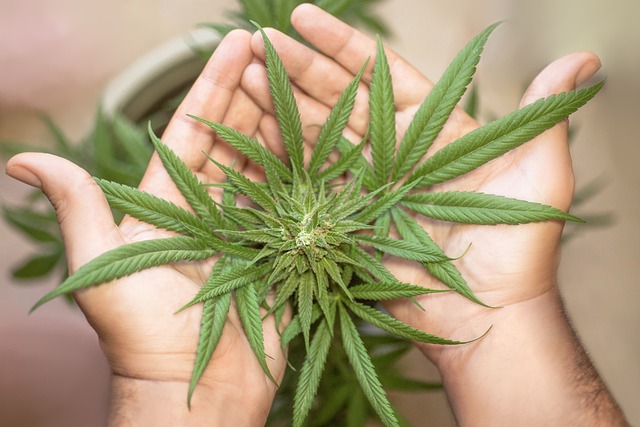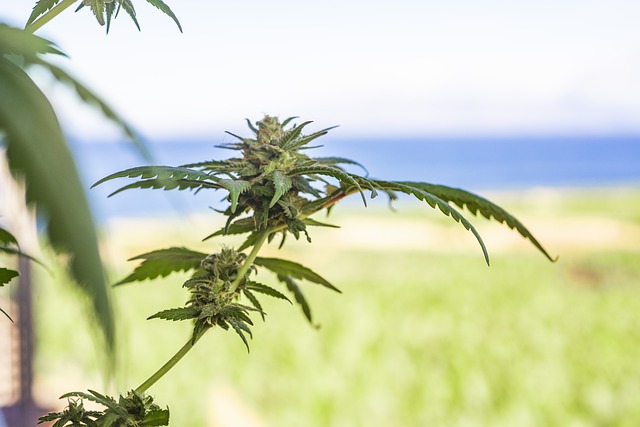In Australia, THCA (tetrahydrocannabinolic acid), a non-psychoactive compound found in cannabis plants, is gaining recognition for its potential therapeutic benefits such as anti-inflammatory and neuroprotective properties. Its legal status varies by state, with some regions like New South Wales, Victoria, Queensland, and Western Australia permitting THCA flower for medical use under special access schemes or clinical trials, overseen by the Therapeutic Goods Administration (TGA). Patients in these states can legally obtain THCA through a prescription from a specialist physician. It's important for individuals to stay informed about the evolving cannabis laws within their jurisdiction, as access and regulations are subject to change. Research is ongoing to explore THCA's benefits further, with a focus on its role as a safe alternative for managing various health conditions within the legal framework established by Australian state legislation. The scientific community is actively investigating how THCA can contribute to well-being, particularly in states where it is legally permissible for therapeutic use.
Discover the burgeoning world of THCA flower, a natural wellness aid gaining attention across Australian states. As we delve into its therapeutic potential and legal standing within these regions, this article unravels the science behind THCA’s health properties. Join us as we explore its benefits and uses, offering valuable insights for those intrigued by the intersection of cannabinoid wellness and regulation in Australia.
- Exploring the Therapeutic Potential of THCA Flower: Legal Insights in Australian States
- The Emergence of THCA as a Natural Wellness Aid: Benefits and Uses
- Navigating the Science Behind THCA Flower: A Deep Dive into Its Health Properties
Exploring the Therapeutic Potential of THCA Flower: Legal Insights in Australian States

The therapeutic potential of THCA flower, the raw and unprocessed form of tetrahydrocannabinolic acid, has garnered significant attention in recent years. In the context of Australian legislation, it’s imperative to navigate the complex legal landscape that varies across different states and territories. As of the current regulatory framework, THCA flower legality is subject to stringent controls and is only lawful for therapeutic use under special access schemes or clinical trials in several Australian states. For instance, in New South Wales and Victoria, patients with debilitating conditions may qualify for legal access to medical cannabis products, including THCA flower, through a specialist doctor’s prescription. Similarly, in Queensland and Western Australia, regulatory pathways exist for the use of medical cannabis under certain circumstances, governed by state-specific legislation and the Therapeutic Goods Administration (TGA) guidelines. It’s crucial for individuals interested in exploring THCA as a therapeutic option to stay informed about the evolving legal status of cannabinoids within their respective jurisdictions, as policies may change and access criteria can vary. Understanding the nuances of THCA legality in Australia states is a critical first step for patients, healthcare providers, and researchers interested in the medicinal benefits of this compound. As such, staying abreast of the latest legal developments at both state and federal levels is essential for anyone seeking to utilize or study THCA flower’s therapeutic properties within the legal framework established in Australia.
The Emergence of THCA as a Natural Wellness Aid: Benefits and Uses

The non-psychoactive compound THCA, or tetrahydrocannabinolic acid, has garnered attention within the natural wellness sphere, particularly in regions where its legal status allows for such exploration. THCA is the raw form of THC, the most well-known cannabinoid found in cannabis plants. As it stands, in certain Australian states, THCA has been embraced for its potential therapeutic properties, which are being investigated for their impact on various health conditions. Unlike its psychoactive counterpart, THC, THCA is non-intoxicating and is believed to offer a range of benefits without the mind-altering effects. It’s being researched for its anti-inflammatory, neuroprotective, and potential analgesic qualities, which could make it a valuable addition to wellness routines in compliance with local regulations.
Advocates for natural wellness have been particularly interested in THCA due to its versatility and the breadth of conditions it’s being studied for, including chronic pain management, anxiety reduction, and as an antiemetic agent. The legal landscape in various Australian states has evolved to accommodate the growing interest in cannabinoids, with THCA becoming a focal point for those seeking alternatives to conventional treatments. As research continues to unfold, the potential of THCA as a natural aid in maintaining health and well-being is becoming increasingly clear, offering hope to many who are exploring new avenues for holistic healthcare within the legal framework established by Australian states.
Navigating the Science Behind THCA Flower: A Deep Dive into Its Health Properties

Delta-9-tetrahydrocannabinolic acid (THCA) is a non-psychoactive cannabinoid found in the Cannabis sativa plant, which has garnered attention for its potential health benefits. As research continues to evolve, studies suggest that THCA may possess anti-inflammatory, neuroprotective, and analgesic properties. In Australia, the legal status of THCA flowers varies by state and territory, with regulations reflecting a complex interplay between federal and local laws. In states like Queensland, New South Wales, and Victoria, where cultivation for medical and scientific purposes is permitted under the Narcotic Drugs Act 1967, consumers can explore the potential wellness benefits of THCA flowers legally. The therapeutic applications of THCA are under investigation, with preliminary findings indicating its potential to alleviate symptoms associated with various conditions without the psychoactive effects typically linked to delta-9-tetrahydrocannabinol (THC). This distinction is particularly relevant in regions where cannabis legislation is evolving, and consumers seek safe and legal alternatives for health and wellness. As such, the scientific community remains engaged in unraveling the full scope of THCA’s benefits, with a focus on its potential to contribute positively to the well-being of individuals within the context of Australian legal frameworks.
THCA flower, or tetrahydrocannabinolic acid, has emerged as a multifaceted wellness aid with a burgeoning presence in the Australian market, particularly as its legal status becomes clearer across various states. The exploration of THCA’s therapeutic potential reveals a natural compound rich in health benefits, from its anti-inflammatory properties to its promising effects on pain and anxiety management. As we delve into the science behind this cannabinoid, it’s evident that THCA holds significant promise for those seeking alternative or complementary remedies. With increasing accessibility and a growing body of research, THCA flower stands out as an exciting development in natural health solutions, especially within the legal frameworks established in Australian states.
